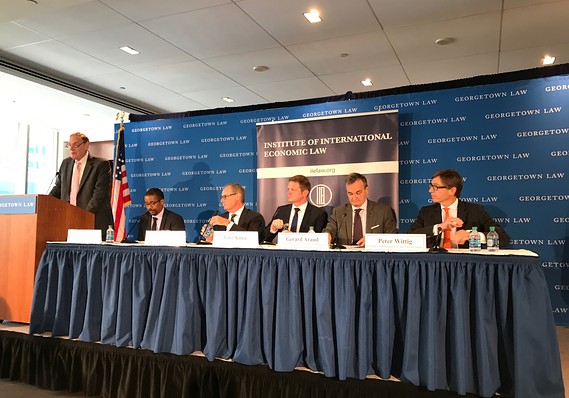WASHINGTON — Top European diplomats on Monday expressed concern over the European Union’s future and the long-term survival of the single market in the wake of Britain’s vote to leave the grouping.
Britain voted in June to trigger a so-called Brexit. “It’s a sad day,” said Gérard Araud, the French ambassador to the United States, at an event at Georgetown University. “The British are an essential part of Europe in every sense of the word. They were our best enemies in history and really we want to keep them on board.”
David O’Sullivan, the European Union’s ambassador to the United States, said he could not imagine a “single market” without Britain’s continued commitment to the “four freedoms,” a set of treaty provisions that guarantee free movement of goods, services, people and capital.
“The single market is the four freedoms,” he said. “If you want trade access to the EU without freedom of movement, it’s something else. I think there are certain fundamental values of the European Union which will be maintained.”
O’Sullivan predicted a myriad of far-reaching consequences that will make the global economy “poorer” and “less well off.” The decision, he added, stemmed from a “misplaced sense of lost sovereignty” and Britain’s initial hesitation in joining the EU.
Some experts say the decision will cripple Britain’s economy, while others insist the country will flourish once freed from what they consider the EU’s punitive tariffs and burdensome regulatory barriers.
Speaking at Monday’s event, the French ambassador called Britain’s vote a form of transatlantic “Trumpism,” referencing the sense of nationalism evoked by Republican nominee Donald J. Trump.
“The people, in a sense, are sending us a sort of ‘middle finger,’” Araud said in an interview after the event. “It would be a major mistake to simply say the people supporting Trump … the far-right or Brexit are morons or fascists. No, they are telling us, ‘Here there is a real crisis, you have to take care of us.’”
Araud said conflicting “red lines” among the remaining 27 member states would make negotiations “extremely difficult,” if not impossible. Over the next few years, he added, the EU’s main goals will be unity, defining borders and maintaining a common culture.
To remain unified, the EU will need to hold its own in the Brexit negotiations, said Peter Wittig, the German ambassador to the United States. Those negotiations are set to begin in March, when British Prime Minister Theresa May has pledged to trigger Article 50, the EU’s formal exit mechanism.
“An exiting country cannot be better off outside the EU than it was as a member,” Wittig said. “Otherwise, the EU would be endangered to unravel.”
Wittig maintained the U.S. should not write off Europe, while admitting to the shock of Brexit.
“No silver lining,” he said. “We lost an ally. We lost a great free-market economy. We lost a beacon of freedom in history.”



